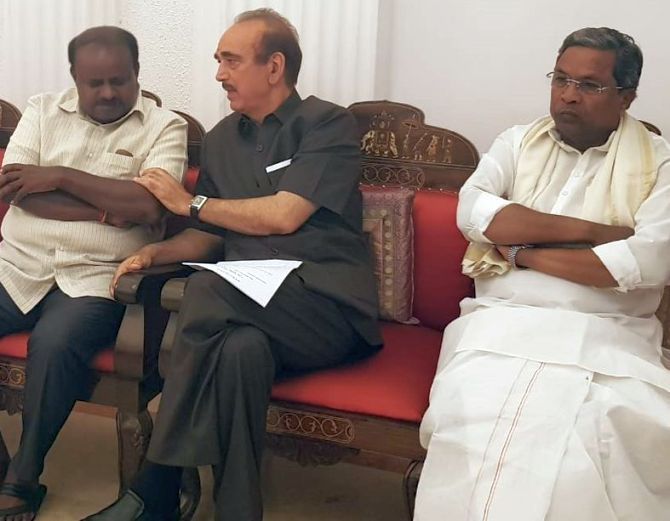12 years after he was sacked form JD-S, Siddaramaiah, offered Karnataka's CMship to his political foe Kumaraswamy.

He was thrown out of the Janata Dal-Secular in 2005 for anti-party activities following his sharp differences with its leadership over H D Kumaraswamy's growing clout in the party.
Twelve years down the line, Siddaramaiah, the 69-year-old leader from the backward Kuruba community, on Tuesday offered Karnataka's chief ministership to his political foe Kumaraswamy whose party finished a poor third with barely 37 seats in its kitty.
Siddaramaiah suffered a humiliating defeat in Chamundeshwari where he lost to G T Deve Gowda of the JD-S by over 36,000 votes, but managed to win Badami by a slender margin of 1696 votes against Bharatiya Janata Party's B Sreeramulu, a sitting saffron party MP and close aide of the controversial Reddy brothers.
Despite being considered an "outsider" by a section of the Karnataka Congress for his socialist roots, Siddaramaiah became the first chief minister since Devraj Urs (1972-77) to complete a full five-year term in office.
Born into a poor farming family in Siddaramanahundi village in 1948, Siddaramaiah, the second of five siblings, did not have formal education initially, and joined school in the 5th grade.
Overcoming adversity, he did his BSc and obtained a degree in law. He practised law and even taught it for a while in Mysuru.
Siddaramaiah, who goes by the single name, joined politics under the influence of Nanjunda Swamy, a farmer leader who campaigned against agricultural patenting by multinational corporations.
He made his debut in the assembly in 1983 from Chamundeshwari constituency on a Lok Dal ticket. He later joined the Janata Dal.
Admired for his canny political sense and his rustic, down to earth characteristics, Siddaramaiah climbed up the ladder in the Janata Dal, and served as minister in the party's governments. He also served as deputy chief minister twice.
A seven-term legislator, Siddaramaiah followed his mentor H D Deve Gowda after the Janata Dal split and the former prime minister formed the JD-S.
Siddaramaiah later floated his own party-- All India Progressive Janata Dal -- following his expulsion from the JD-S.
He had irreconcilable differences with Deve Gowda over the growing influence of his son H D Kumaraswamy in the party.
The expulsion came when Siddaramaiah started actively particiating in the AHINDA (Kannada acronym for minorities, backward classes and Dalits) movement. Castes and communities constituting the AHINDA were considered the bedrock of the Congress's support base in Karnataka.
Siddaramaiah later merged his party with the Congress.
In the 2006 assembly elections, Siddaramaiah contested from Chamundeshwari on Congress ticket and won by a wafer thin margin of 257 votes against the JD-S candidate.
However, he had exacted a sweet revenge.
He was appointed chairman of the publicity committee of the Congress in the 2008 assembly polls, which the BJP won.
He was then appointed the Leader of the Opposition, a reflection of his growing clout in the Congress.
The BJP's stint in power was marred by intra-party feuds and allegations of corruption.
When the BJP lost the 2013 polls, Siddaramaiah was appointed the chief minister.
Known for taking bold decisions, Siddaramaiah decided to celebrate 'Tipu Jayanti', a move denounced by the BJP as "appeasement politics".
His government also took the controversial decision of recommending religious minority status for the influential Lingayat community in the run up to the polls.
He launched a plethora of populist schemes like the Annabhagya for free distribution of rice, Ksheeradhare under which subsidy was given for milk, Vidyasiri that made available hostel facilities for students, and many others.
The Siddaramaiah government also substantially raised the budgetary allocations for Dalits.
These populist measures were expected to effectively insulate Siddaramaiah against allegations of corruption as Modi mounted an aggressive assault, calling him a "Seedha rupaiah government" and "10 per cent commission government".
Apparently, the charges did stick.











 © 2025
© 2025